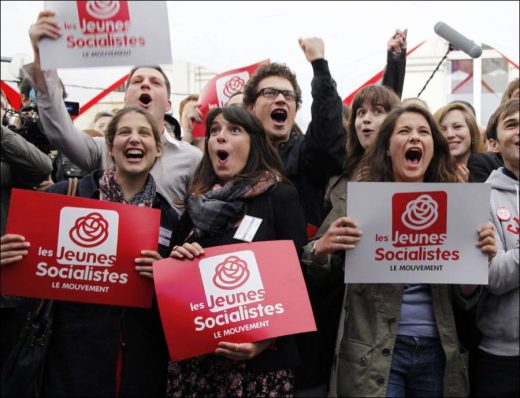The Socialist Party (Parti Socialiste or PS), a centre-left party, was one of the two largest parties of the 5th Republic, founded by De Gaulle, until the 2017 presidential elections. The party has produced presidents who have deeply influenced French politics, except for the 2002 and 2017 presidential elections, it has always been in the second round and has managed to become either the ruling party or the main opposition in the elections.
In the 2012 elections, PS candidate François Hollande came first with 28.63 percent in the first round, and was elected president with 51,6 percent of the votes in the second round. The 2017 presidential election was an unexpected and incredible fall election for the Socialist Party. The party’s candidate, Benoit Hamon, received only 6.4 percent of the vote. The current presidential candidate of the PS, Anne Hidalgo, is currently walking around with low vote rates of 2-3 percent.
I examined the French left in general terms; I explained the current situation of the left and its division, what they can do in the elections and the new candidates on the left. In this article, I will look for an answer to why the PS, which was once in power, collapsed and I will dwell on the reasons for its low votes. In other words, we can say that this article is a continuation of the “French Left and Elections” article.
Before I begin, let me write why I only study PS and not other left parties. As the introduction suggests, the PS was the leader of the left in France. Other left parties have not been as active as the PS and they generally hover around 3-5 percent at most. Only one of the current left candidates, Jean-Luc Mélenchon, took 19.6 percent of the vote in the 2017 elections, taking advantage of the decline of the PS and winning the left voters who broke away from the PS.
Now, Mélenchon’s vote share is around 9-10 percent, as in the 2012 elections. The reason for the decrease in the vote rate is Mélenchon’s rhetoric and actions that will put his own credibility into question. In other words, the rise and fall in Mélenchon’s votes are both due to instantaneous reasons and not as complex as PS. In summary, the PS has a special place in the left of France and its collapse should also be examined.
Hollande’s Negative Perception of Mind
François Hollande, who was elected president in 2012, had come to terms with promises to implement social reforms, grow the economy and reduce unemployment. But he failed to deliver on these promises. Unemployment rose, economic growth could not be achieved and social reforms could not be implemented. On the contrary, Hollande, who introduced himself as a reformist in the elections, enraged both voters and party members by implementing pro-market neo-liberal policies.
Hollande’s failure to keep his promises led to the questioning of his and his party’s credibility. The blunders he made during his rule, his U-turns, and his failure to prioritize problems gave Hollande the impression of being an amateur politician. Six months after being elected, Hollande’s approval rating dropped to 36 percent. This rate is the lowest when we compare it with the approval rate that other presidents have in the same period. This rate dropped to 26 percent in 2013. Although Hollande’s popularity fell during his rule, his popularity increased due to his attitude, especially in 2015, when the terrorist attacks took place.
Despite this, his popularity continued to decline for the reasons I listed, and his approval rate at the end of his term was only 4 percent (5). This was the lowest approval rate ever for a French president. Therefore, he did not run again in the 2017 elections. He did not become a candidate, but the Hollande period created an incredibly negative perception on the electorate. PS voters turned away from the party and turned to other parties. This was one of the most important factors in the collapse of the party.
Intra-Party debates and 2017 elections
Especially after the party won the 2012 presidential elections and during the 2017 presidential elections, the conflicts within the party and the departure of important figures from the party reduced the power of the party. The first major clashes and resignations took place in 2014. President Hollande’s pro-free market policies angered ministers on the left wing of the party. Names such as Economy Minister Arnaud Montebourg,
Education Minister Benoit Hamon (the party’s presidential candidate in the 2017 election) and Culture Minister Aurelie Filippetti have resigned. Christiane Taubira, one of the current presidential candidates and then Minister of Justice, who was on the left wing of the party, also resigned in 2016 due to finding Hollande inadequate on issues such as the fight against terrorism and human rights.
The party also witnessed fights during the nomination process of the 2017 presidential elections. Benoit Hamon became the party’s nominee, defeating Manuel Valls, the party’s centrist candidate and prime minister from 2014 to 2016, breaking the party’s program radically to the left. Thereupon, a significant part of the centrist wing of the party (including Valls) left the party and announced that they would support Emmanuel Macron (who was an independent minister of economy in 2014-2016), who was the centrist politician at that time, in the presidential elections.
Thus, the party gradually lost its organizational power. Mélenchon, who was further left of the PS, was also able to win the PS’s more left-wing voters, since he did not go through a bad power process like the PS and did not deal with intra-party conflicts. Macron also won the PS voter close to the centre.
In this way, while Mélenchon increased the 11 percent of the votes he received in 2012 to 19.6 percent in 2017, Macron, who was included in the presidential race much later, was able to come to power. In other words, the party was divided due to the internal fights that have been going on for years, and it lost its power and left the square to other parties and names.
Excess of Left Parties
As I have emphasized in my previous articles, there are many leftist parties in France. Of course, the fact that there are many left parties is not a factor that caused the collapse of the PS alone. When the PS was strong, there were also left parties. So, why did the excess of left parties cause the collapse of the PS, especially in the 2017 elections, not before? The role of a large number of left parties is actually this: Voters who break with the PS can find other alternatives.
For example, as I mentioned in the above section, voters who break away from the PS may find themselves in Macron (although he is not a leftist, he can be an alternative for PS voters), Mélenchon or other left parties. In the 2022 elections, Yannick Jadot from the Green Party, Fabien Roussel from the Communist Party, which has been on the rise recently, and Taubira, who is well known by PS supporters, can also be alternatives for PS voters. PS voters are not dependent on PS and there are other parties they can turn to. This situation accelerates the collapse of PS, which cannot recover itself.
Discourses Not Reciting in Elections
I explained in my article titled The French Left and Elections; this is actually the general problem of the left, but it should be mentioned here as well. According to a study by a Paris-based think-tank (6), the PS presidential candidate, Hidalgo, is a candidate from the left, but does not receive support from the working class because his rhetoric does not attract attention. The cost of living and living conditions are of particular interest to the voters.
Although PS addresses these issues, it is not effective enough. For example, the party should have been more active in the recent protests against the cost of living in France, precisely in the areas of interest of the PS, but we did not see them much. In addition, right-wing candidates put a lot of emphasis on issues such as immigration, identity, security, and these are other issues that voters are actually interested in. Despite this, the PS (and the left in general) fails to produce discourse and policy in these areas. This causes the party to be unable to attract voters.
In summary, the party has lost and is losing its power due to the problems it has been experiencing since 2012. The already existing situation, such as the excess of alternative parties, accelerates the collapse as the party loses power. The inability to produce rhetoric that will attract voters also hinders the recovery and continues the collapse.
Visits: 101



